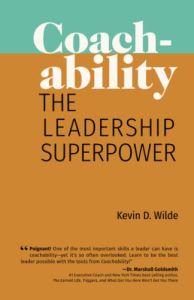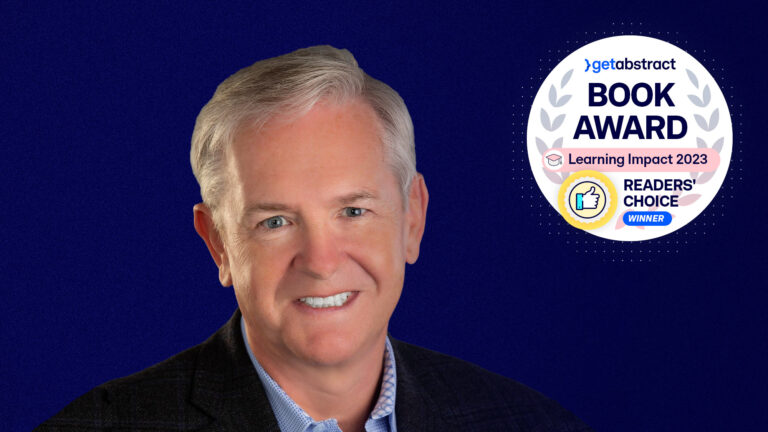Join getAbstract to access the summary!

Join getAbstract to access the summary!
Kevin Wilde
Coachability
The Leadership Superpower
Kevin Wilde, 2022
What's inside?
Become a better leader by learning to harness feedback.
Recommendation
Veteran leadership development executive Kevin Wilde persuasively argues that learning how to accept feedback as a leader has far more value than learning how to deliver it. This concise, intriguing read offers copious data and field research that demonstrates how leaders can make the most of feedback, that is, improve their “coachability.” More importantly, he believes anyone can develop coachability and outlines numerous strategies to do so. Wilde brings to bear 17 years as head of leadership and talent management at General Mills, along with his current, cutting-edge research at the University of Minnesota.
Take-Aways
- As leaders gain experience and grow older, their receptivity to coaching and feedback often declines.
- Lack of coachability derails many leaders’ careers.
- Arrogance, insecurity and isolation inhibit leaders’ ability to receive and use feedback.
- Highly coachable leaders are viewed consistently as more skilled than their less coachable counterparts.
- People can learn to be coachable: Coachability depends on practice and mind-set more than on innate traits.
- To make yourself more coachable, proactively seek out feedback and ideas for improvement.
- Listen actively, reduce your natural defensiveness and treat feedback as a learning opportunity.
- Reflect on feedback, but avoid getting paralyzed by overthinking.
- Make meaningful changes based on feedback you receive. Create an action plan to ensure your success.
Summary
As leaders gain experience and grow older, their receptivity to coaching and feedback often declines.
Organizations spend billions annually on developing leaders, yet CEOs still complain about the lack of a leader pipeline. Unfortunately, as workers become leaders and gain experience, their willingness to improve through feedback and coaching often declines. Most firms want leaders to be able to coach, so they emphasize coaching skills – while neglecting or completely overlooking the importance of “coachability”: leaders’ ability to seek and respond to feedback in order to improve. Coachability skills boost leaders’ effectiveness and careers; they make it possible for leaders to continually develop.
“We tend to lose our formerly strong feedback and coach-seeking habits as we get older and advance in a career.”
To illustrate the importance of coachability, imagine someone lost a cell phone and searches for it in a room full of people – all of whom know where the phone is. First, the people in the room remain silent. Then they start to say encouraging things, like “I know you can find it!” and “Nice shoes!” Notice how the words of support don’t offer any real help in finding the phone. But now, the group starts saying “warmer” or “colder” as the phone-seeker moves closer or farther from finding their mobile. Now the person quickly finds their phone with these prompts from the group.
This exercise illustrates the challenges of staying on course as you pursue leadership development. Warm and fuzzy encouragement can leave you floundering. But clear feedback from people who know the right direction can help you reach your goals. To remain effective, leaders must regularly seek out coaching and training, which can boost their personal and organizational success. In addition, start a coachability notebook, and use it to record helpful practices and tips.
Lack of coachability derails many leaders’ careers.
A coaching expert led an exercise where he asked leaders to move around the room from person to person to share their weaknesses and seek ideas for improvement. The executives weren’t accustomed to behaving so vulnerably; at first, they resisted but ended up participating with gusto. Many admitted to learning from the exercise. Yet, mysteriously, few wanted to repeat the activity in future meetings.
“Given a choice to train managers to be better coaches or employees to be more coachable, bet on the power of coachability.”
As this story suggests, although coachability is crucial for leaders’ success, they can find it difficult to embrace. An aversion to vulnerability, desire to maintain control or fear of the unknown can get in the way. Coachability requires openness to new ideas and a commitment to continuous learning and improvement.
Arrogance, insecurity and isolation inhibit leaders’ ability to receive and use feedback.
All leaders develop limiting beliefs as they advance in their careers. Often, by the time they reach the senior executive level, their coachability has declined to almost nil. The following habits and assumptions account for these declines:
- Arrogance – As leaders move up and enjoy increasing success, they can begin to feel they’ve reached the “finish line” and have nothing left to learn.
- Facade of strength – Leaders might avoid asking questions or acknowledging knowledge gaps because they fear appearing weak.
- Susceptibility to flattery – Often, bosses find themselves surrounded by employees who compliment and praise them in pursuit of their own career advancement. Leaders need to make clear they want the whole story and won’t punish people for offering it.
- Isolation – Newly promoted leaders can find themselves isolated from peers – and the feedback they need from colleagues in order to learn.
- Deprioritizing feedback – Sometimes, leaders realize they need to improve their coachability but keep putting it off, instead choosing to prioritize other goals and tasks.
In your coachability notebook, ask yourself whether you see any of these counterproductive habits and attitudes in yourself, and list the consequences. Also consider whether you currently accept and process feedback as openly now as you used to.
Highly coachable leaders are viewed consistently as more skilled than their less coachable counterparts.
Some leaders remain coachable even as they age and take on greater responsibility. A study of 50,000 leaders showed highly coachable leaders are consistently seen as better and more skilled leaders, and they receive higher ratings in critical competencies such as innovation, inspiration, strategy and collaboration than their less coachable counterparts. Highly coachable leaders maintain greater levels of employee motivation and engagement, leading to greater productivity, sales and customer satisfaction; their teams prove more adaptable, productive and promotable. Coachable leaders, not surprisingly, also earn high performance ratings.
“The top 20% of the most coachable leaders were four times more likely to be rated as highly effective overall versus the bottom 20%.”
Leaders who exhibit low coachability tend to develop blind spots, have difficulty acquiring new skills and miss opportunities. As a result, their careers often stagnate or collapse. Many factors can contribute to declining coachability, such as a lack of self-awareness, an obsession with control, and disinterest in learning and feedback. On the other hand, a learning mind-set and a willingness to seek and respond to feedback help maintain high levels of coachability. Too often, leaders focus more on developing the skills required to give feedback rather than receive it; receptivity to feedback should merit at least as much attention.
People can learn to be coachable: Coachability depends on practice and mind-set more than on innate traits.
Many factors can affect a leader’s coachability, including a toxic work environment and culture. A highly competitive work culture, noxious bosses, or a prevalence of negative workplace habits and attitudes can reduce an individual’s coachability. High demands for workplace structure, routine and process can also work against a person’s coachability.
Drive, competitiveness and confidence, which can be positive qualities, can also hinder a person’s coachability, since they can cause leaders to promote action and achievement over learning and reflection. However, practically anyone can develop coachability by committing to improvement. A coachability assessment can help you determine your own level of coachability.
“A coachable leader values self-improvement and operates consistently in a learning zone by applying the coachability practices of seek – respond – reflect – act.”
Coachable leaders don’t just stay open to feedback, they actively seek it out, and they listen carefully. They show a willingness to learn and adapt. Highly coachable leaders possess a growth mind-set and exhibit mindfulness and self-awareness. They listen to feedback without interruption or defensiveness and express gratitude for the critique. They reflect on what they’ve heard, assessing its value and relevance to make their own determination about what to embrace or discard. Finally, and crucially, they act by incorporating the feedback into their efforts, behavior and goals.
To make yourself more coachable, proactively seek out feedback and ideas for improvement.
Seven strategies can help you seek feedback on a regular basis and become more open to learning and improvement:
- Be specific – People tend to give generic responses to generic questions like, “How am I doing?” Instead, ask for feedback in specific areas.
- Ask two questions – When you seek feedback about your performance, ask both, “What’s good?” and “What could be better?”
- Hold after-action reviews – After important tasks or projects, conduct a review to discuss what happened, why it happened and how to improve next time.
- Make a plan – Map out a plan for your learning and improvement. Include what you want to learn; specify how, when and where you’ll obtain new information.
- Ask a truth-teller – Find a trusted person who’ll give you unvarnished, honest feedback.
- Look for signs – Stay attuned to signals, both direct and indirect. These subtle cues can provide insight into how others perceive you.
- Seek clarity – Whenever you’re in doubt about an item of feedback, seek clarification.
Listen actively, reduce your natural defensiveness and treat feedback as a learning opportunity.
It’s easy for people to say they want feedback, even tough truths, but humans’ natural reaction is to become negative and defensive. Even highly coachable leaders have to battle these reactions. Leaders responsive to coaching have learned to quiet the negative voices in their head, stop denying what they hear, or evaluate the credentials of the person giving the feedback. Instead, they focus on capturing the main message and assessing its accuracy. To increase your own receptiveness to feedback, establish a routine to help you shift your focus and remain curious and open.
“The truth is our experience of receiving the so-called gift of feedback is not all that pleasant.”
To increase your understanding of a piece of feedback and to help you evaluate it, approach it as a learning opportunity. In the theater, good actors welcome their colleagues’ and director’s “notes” – everyday feedback and suggestions. The Actors’ Equity Association’s code of conduct encourages actors to listen to feedback, write down comments, avoid arguing and offer thanks.
Like a good actor, rather than get defensive, tell yourself to “take a note.” Hush your negative inner voice, listen, stay curious, and ask for details and examples. Repeat back what you think you’ve heard. Acknowledge and express appreciation for the feedback, even if you don’t agree with it, which shows respect and builds trust. Seek input from a broad range of sources to gain a comprehensive understanding of your strengths and weaknesses.
Reflect on feedback, but avoid getting paralyzed by overthinking.
Instead of jumping straight into action after you hear feedback, take time to reflect on it. Ask three simple questions: “What did I hear?” “What do I think?” and “What’s next?” By taking time to reflect, you can develop a clearer and deeper understanding of the feedback you receive. Reflection gives you an opportunity to decide what’s useful and to develop a plan for improvement. Consider asking a coach or mentor to guide your reflection process and provide additional perspectives.
“Not everything you receive needs to be accepted or acted upon, but it should always be reviewed.”
Make reflection a habit. Incorporate it into your daily, weekly and monthly routines. Every day, take five minutes to review your calendar, think about the events of the day and reflect on your progress. Each week, journal for 15 minutes, reflecting on the week and lessons learned. Monthly, set aside an hour for a more thorough inventory; consider using a checklist to be sure you cover all areas. Instead of always listening to news or podcasts while you exercise, walk or commute, use some of that time to reflect. Find a method that works for you, so you can develop a habit of reflection. However, don’t get lost in analysis. The gravity of the decision or action you’re considering should dictate how much time you devote to thinking about it.
Make meaningful changes based on feedback you receive. Create an action plan to ensure your success.
Highly coachable leaders don’t just reflect: They act. They manage their own personal development; leaders increase their chances of making meaningful change by anticipating potential obstacles and designing strategies to ensure success. To achieve this, think about what success and failure would look like. To avoid traps, consider what could go wrong; think about experiences that have stymied you in the past. Construct a clear picture of success, affirm your personal motivation and use reminders to translate your action plan into everyday routines. Ensure your action plan is both sufficient and simple enough to help you succeed.
Use time management and goal-setting tactics to support your ambitions for personal growth. These might include starting small, eliminating distractions, setting up reminders, working on difficult tasks during your most productive time of day, or creating a daily dashboard to keep yourself on course and track your progress.
“Progress is rarely linear or guaranteed. The coachability journey is knowing that not every day will be your best, and we all fall short at times.”
Don’t expect to make linear progress with your coachability skills. You’ll experience setbacks, but stay open and keep learning. High coachability requires actively seeking out opportunities for growth, remaining open to new perspectives, staying curious and experimenting with new approaches. Boost your coachability by pursuing teachable moments, reducing your defensiveness and increasing receptivity to feedback. These methods can help you become a more trusted and capable leader.
About the Author
Kevin D. Wilde is an executive leadership fellow at the University of Minnesota, where he teaches and researches leadership, coaching and talent development. His career has included 17 years serving as General Mills’ senior talent development executive, preceded by 17 years at General Electric, where he participated in its renowned corporate leadership training center.
This document is restricted to personal use only.






















Comment on this summary